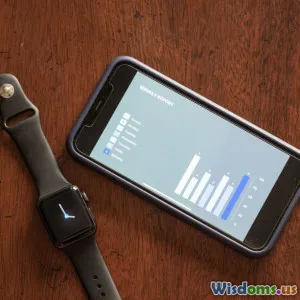
Advancements in Digital Health
9 min read Explore groundbreaking advancements in digital health revolutionizing medicine and patient care worldwide. (0 Reviews)
Advancements in Digital Health: Revolutionizing the Future of Medicine
Introduction
Imagine a world where healthcare is swift, personalized, and accessible anywhere, anytime. This vision is quickly becoming a reality thanks to remarkable advancements in digital health technologies. From artificial intelligence algorithms diagnosing diseases to wearable devices monitoring vital signs in real time, digital health is transforming how we understand and manage wellness. In this article, we delve deep into the most groundbreaking innovations driving this healthcare revolution, supported by real-world examples and insights.
The Evolution of Digital Health
Over the past decade, digital health has emerged at the intersection of medicine, technology, and data science. Defined broadly as the use of digital tools and platforms to improve health outcomes, digital health encompasses mobile apps, telemedicine, electronic health records (EHRs), AI-powered diagnostics, and more.
The surge in smartphones and internet connectivity accelerated adoption. The COVID-19 pandemic further highlighted the critical role of remote health tools, rapidly expanding telemedicine usage from 11% of patients in 2019 to over 46% in 2020 according to McKinsey & Company. This paradigm shift signals a new era where physical distance no longer limits quality care.
Key Advancements in Digital Health
1. Artificial Intelligence (AI) and Machine Learning
Arguably the largest catalyst in digital health advancement has been AI. By analyzing massive datasets beyond human capacity, AI algorithms enhance diagnostic accuracy, predict disease progression, and personalize treatment plans.
Example: Google's DeepMind developed an AI system capable of diagnosing over 50 eye diseases from retinal scans with an accuracy comparable to top ophthalmologists. Similarly, IBM Watson Health has supported oncology care by recommending tailored cancer treatment options based on patient data.
The integration of AI in radiology, pathology, and genomics enables earlier detection of conditions like cancer and cardiovascular disease, improving survival rates dramatically.
2. Wearable Devices and Remote Monitoring
Wearables have transcended fitness tracking, evolving into critical medical tools. Smartwatches, patches, and implantables continuously monitor heart rate, oxygen levels, glucose, and even arrhythmias.
Case in Point: The Apple Watch's FDA-cleared ECG app has detected atrial fibrillation in millions, facilitating early intervention to prevent strokes. Another innovation, Abbott’s FreeStyle Libre, offers continuous glucose monitoring for Type 1 and Type 2 diabetics, enhancing glycemic control without finger-prick tests.
Remote patient monitoring not only empowers individuals to manage chronic diseases more effectively but also eases the burden on healthcare systems by reducing hospital visits.
3. Telemedicine and Virtual Care Platforms
Telehealth platforms have exploded in popularity. By connecting patients and providers via video, phone, or messaging, telemedicine bridges access gaps especially for rural or underserved communities.
Statistic: A study published in the Journal of the American Medical Association reported a 50% reduction in emergency visits and hospital admissions due to telehealth management of chronic obstructive pulmonary disease (COPD) patients.
Beyond convenience, virtual care solutions accelerate clinical decision-making and enable multidisciplinary collaboration, enhancing quality and timeliness of care.
4. Big Data Analytics and Electronic Health Records (EHR)
Modern healthcare generates enormous data streams. Advanced analytics harness these datasets to identify trends, measure treatment effectiveness, and improve population health management.
FHIR (Fast Healthcare Interoperability Resources) standards now allow interoperability between diverse EHR systems, facilitating seamless data exchange across providers.
Insight: Mayo Clinic uses big data analytics to proactively detect patient deterioration and predict sepsis onset hours in advance, enabling lifesaving early interventions.
5. Personalized Medicine and Genomics
The decreasing cost of genomic sequencing combined with AI has accelerated personalized medicine — tailoring treatments based on genetic profiles.
Notable Example: Precision oncology uses a patient’s tumor genomics to select targeted therapies, improving efficacy and reducing side effects. Foundation Medicine’s genomic profiling tests have been integrated widely, supporting customized cancer care.
Pharmacogenomics, which assesses how genes affect drug response, is another breakthrough improving dosage accuracy and safety.
Challenges and Ethical Considerations
Despite phenomenal progress, digital health faces hurdles:
-
Data Privacy and Security: Breaches can jeopardize sensitive health information. Regulations like HIPAA and GDPR guide safe data handling but evolving threats require robust tech safeguards.
-
Digital Divide: Unequal access to technology risks widening health disparities if remote solutions aren’t accessible to all demographics.
-
Clinical Validation: Many new digital tools require rigorous trials to validate efficacy and avoid misdiagnosis or overtreatment.
-
Provider Adoption: Integration into clinical workflows and provider training remain barriers for widespread use.
Addressing these issues is paramount to responsibly harness digital health’s full potential.
Future Outlook: Toward an Integrated Digital Health Ecosystem
The trajectory of digital health points toward increasingly integrated, AI-driven, and patient-centered care models. Emerging technologies include:
- Digital therapeutics offering evidence-based interventions delivered via apps or devices.
- Blockchain solutions for secure, decentralized health records.
- Augmented reality (AR) and virtual reality (VR) enhancing medical training and rehabilitation.
- 5G connectivity enabling faster, real-time remote surgeries and diagnostics.
Coupled with advancing AI and big data, these innovations promise to not only transform healthcare delivery but also promote preventive and precision health on a global scale.
As Dr. Eric Topol, renowned cardiologist and digital medicine pioneer, states, “The future of medicine is not flipping healthcare upside down; it's about blending the science of medicine with the art of technology.”
Conclusion
Advancements in digital health are reshaping the face of medicine. Through AI, wearables, telemedicine, and personalized genomics, healthcare has become more precise, accessible, and patient-centered than ever before. Although challenges remain, the ongoing integration of sophisticated technologies holds immense promise for improving outcomes and quality of life worldwide.
For patients, healthcare professionals, and policymakers alike, embracing digital health isn't just an option—it is imperative to achieving a healthier future. Staying informed and engaged with these developments can empower us all to navigate the exciting digital health revolution ahead.
References
- McKinsey & Company, Telehealth: A quarter-trillion-dollar post-COVID-19 reality? (2021)
- JAMA, Impact of Telehealth on COPD Outcomes (2021)
- DeepMind Ophthalmology Research, Nature Medicine (2018)
- Apple Watch ECG Study, Journal of the American College of Cardiology (2019)
- Mayo Clinic Big Data Initiatives (2020)
Written by an AI content generator — combines the latest research, data, and expert perspectives to provide an insightful overview of digital health advancements.
Rate the Post
User Reviews
Popular Posts




















